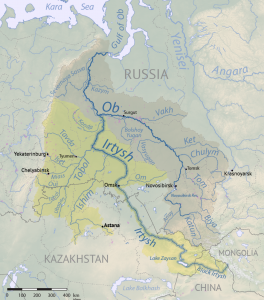
I have begun to believe in magic, in fate, in mysterious forces, in the invisible, and in wishes that might come true. Don’t tell my boss, for my workplace values the rational and empirical, and fully believes that science can explain human behavior, and that everything of importance can be quantified. My clients (a.k.a students) tend to believe this too, and need to be broken in gently. Having come upon an unexpectedly free stretch of time, I decided to follow Chekhov’s footsteps to Sakhalin Island, not fully knowing why. Beyond that there was not much of plan. It was kind of like throwing myself into the void. This was a void of space, but it began to fill with people.
And the people showed the way.
At Melikhovo in July, Postal Museum director Zhenia mentioned that she was traveling to Sakhalin Island in mid-September to mount an exhibit at the Chekhov’s Island of Sakhalin Book Museum in Yuzhno-Sakhalinsk. Well, now, that’s funny. I’m heading there in mid-September too. Why don’t we meet on Sakhalin, where we can just kind of continue the conversation that we have begun here, and finish our cup of tea? The distance between the two towns
(5768 miles, or 9,282 kilometers, or eight hours, if you remain completely still and happen to be in both places at once; or 5 days and 5 hours by car (if you wear a heavy-duty diaper, hook yourself up to an IV for a continual coffee drip, and don’t sleep); or 6 days, 1 hour plus 3 hours if by train and plane; or 11 months or more if trudging in shackles in a prison convoy through the famous four seasons of Siberia (1. blizzard; 2. flood; 3. mosquitoes; and 4. golden autumn [zolotaia osen’)]; or 43 days if lurching from town to town in railway sleeping cars and stopping sloppily along the way in the fall of 2019; or 2 1/2 months if traveling by river and peasant cart in the spring of 1890)
seemed utterly irrelevant. The fuzziness here kind of matches the weird mundanity of the plane ticket I bought for my return from Sakhalin to Moscow. Now please concentrate: the plane leaves Yuzhno-Sakhalinsk on October 4 at 11:50 a.m. and arrives at Moscow Sheremetyevo on October 4 at 12:25 p.m.
If this doesn’t seem strange to you, go back and reread that sentence (and all of the above).
Anyway, this entire rant is a plea to pan back from our reflexive habits of calculating time, space, and value in primitive units of measurement such as hours, miles, and dollars. If you do so, you might get the queasy feeling that our ways of measuring time and space entail more voodoo and irrationality than we generally allow ourselves to believe. After visiting the “original” Western-Russia/Siberia boundary, which some people suggested was in Kazan, though others disagreed; and after seeing “the” Europe-Asia boundary near Ekaterinburg, which some guy just kind of drew with a quill pen a couple of hundred years ago; after buying my share of train tickets on websites giving departures in Moscow time, then receiving the ticket files with departures given in local time; after a dip into a shaman’s wooden tepee on Lake Baikal, and then a trip to the Ivolginsky Datsan in Buryatia (which, measuring by ordinary time, to you is a couple of weeks into the future, and to me already in the past), I am becoming ever-more inclined to toss the whole concept of linear time and space down the trash chute. Here there is freedom to be found.
Excuse me, Carol, don’t be an idiot; you have trains to catch.
In Moscow Vladimir Zakharov showed me the facsimile edition of Dostoevsky’s bible, and said something about a new manuscript edition of Chekhov’s book Sakhalin Island. I thought, no, really, how probable is that? But still, the mention of it was enough to send me off to Tobolsk, where I arrived the very week this astonishing new book, Chekhov’s The Island of Sakhalin–a new one, not some musty 126 year-old tome, came out of the press and was whumped down on my table.
I thought, what else could happen?? So I calmed down and went to Omsk for some Dostoevsky time.
But then I met Sergei.

Sergei Anatolyevich Vorobchukov is on the one hand, a busy man; on the other, a man in possession of infinite time, space, and freedom. A skilled engineer and manager who runs his own business and served in the Russian State Duma in the early 2000s, he also reads a lot. At some point he got bitten by the Chekhov bug, got in his car, and just plain drove from Omsk to the island of Sakhalin, stopping in places that Chekhov mentioned in his travel notes “From Sakhalin.”
Let me just emphasize that “drove” here entails overland, on Russian roads.
And all of this is true.
Maybe, like me, you buy into the “romance of the road,” the open highway, freedom, blah, blah, blah, blah. Maybe you’re used to taking long road trips in the USA, and you may have an image of something like Eisenhower’s interstate highway system, with its neat cloverleaf on- and off-ramps, its brightly-lit gas stations, rest stops, and travel plazas, its smorgasbord of hotels, roadside attractions, stuff for sale, its Triple A and “911”. Or maybe, like me you like to “get off the road” and tool around through small towns, perhaps lucking into a cool coffee shop or quaint village inn with rocking chairs out front, or some cool maple syrup that someone has tapped out of a nearby local tree. Time for a reality check: subtract all that, along with your image of a road as something smooth and paved, multiply every distance you’ve ever traveled by at least five, crack open a copy of Dead Souls, and you might have a tiny glimpse of what a “road trip to Sakhalin” might mean. Oh, and how are you going to get your car from the Far East coast of Russia actually onto the island once (if) you’ve gotten that far?
The only thing comparable in my experience might be a hole in time I spent with my Yaris at bone-dry “Lake” Sevier in northern Utah by the side of rte. 50, the “loneliest road,” listening to the silence hovering over the arid, salty lake bed.

 ,
,Forget it. Multiply this petty stuff by five and then toss in something fancy using calculus, then throw the whole thing out the window, and just acknowledge that you can’t understand what it’s like to drive across Russia to Sakhalin.
The punch line is that Sergei takes this drive almost EVERY YEAR.
OK, I’m in.
I’m not a car person, but in its bigness and blackness, Sergei’s car resembled Arkady Grigorievich’s, which instilled a very high level of hope and confidence in this journey.

Add to this their combined experience of cross-Siberia drives, and Sergei’s encyclopedic and visceral acquaintance of every inch of space that Chekhov crossed on his trip to Sakhalin, not to mention every single word he wrote along the way and afterwards about it, and you will realize that your task is to simply empty out your brain of its entire contents, and sit quietly for the next eight hours.
Sergei proposes to drive with me to Tiukalinsk, a town that Chekhov passed through about the time he wrote that letter to Maria Kiselyova about the sound of coffins in the Irtysh River. This little stretch of time between May 6 and May 9 features a dangerous road accident, unwilling ferrymen, and rainstorms that combine with the springtime thaw to turn the fields into swamp. Chekhov’s felt boots get soaked. After passing through the towns of Kamyshkenskoe, Krutinskoe, and Kolmakovo, he ends up in Tiukalinsk.
Sergei carries with him in the car a well-worn road atlas with all of Chekhov’s stops circled:

Take a quick look; Tiukalinsk is there in bold on the upper squiggle of the yellow line, and Chekhov’s trip follows a path to the right, taking little hops from circle to circle.
It’s maybe three hours from Omsk to Tiukalinsk. A driver like Andrei from Tobolsk would consider it his duty to make it in one, but Sergei mostly yields the left to oncoming traffic, with only a few scattered episodes of Lingering Left Lane. I realize by now that this is a Russian thing, and that they sort of know what they’re doing. I calm my nerves and give over completely to listening.
On a solo car trip to Sakhalin and back you learn how to fix your car. You carry a couple of spare tires, and a kit for repairing them when they blow out. Before your trip you take your car to the garage for a complete workover. You know and trust your mechanic. On the drive, you are open to meeting people, and flexible about your plans. Though it’s springtime, you might find yourself trapped in a fierce, sudden blizzard in which you can see nothing before or behind you. Some slow-moving shadows barely visible through the snow ahead of you might turn out to be a herd of deer who appear, and then when you turn to look again, are gone forever. In Siberia you might meet hardy people who were sent there against their will, but settled there and lived their lives. They all turn out to have stories. Sergei tells some of these stories.
One of Chekhov’s friends reports a conversation with him about where stories come from. Chekhov said that a curious person could find a story idea anywhere,
[…] in lemon slices that smell like onions; in greasy spots on a wall where cabbies have rested their heads: “how can it be that there are no ideas for stories?” Anton Pavlovich insisted. “Everything is a story idea, they are everywhere. […] You can even write well about the moon, even though it’s been done over and over. And it will be interesting. You just have to see something in the moon that is your own, not something that others have worked into the ground. “And how is that not a story idea?” he pointed out onto the street, where dawn was already starting to break. “Look over there: there’s a monk out walking with a cup, collecting donations for a bell…Don’t you feel a good theme just springing up all by itself? …There’s something tragic here—a black-robed monk in the pale dawn…
I wish Sergei would write down his stories. Maybe he will. They are his, not mine, to tell.
Eventually we turn off the main road into Tiukalinsk.

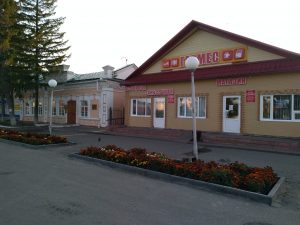

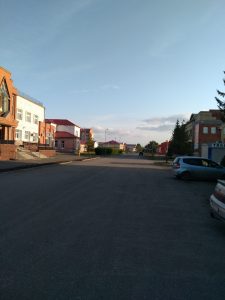
Lenin presides here at the center of town. And through the center of town runs the Siberian post road, along which Chekhov rode the second week of May, 1890. A blue-striped pole marks the “Tiukala” postal station stop from 1759. Travelers stand beside it to be photographed. I wish Chekhov had done this.
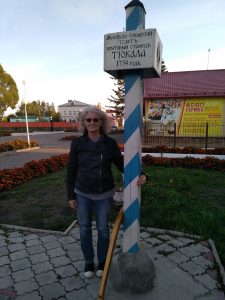
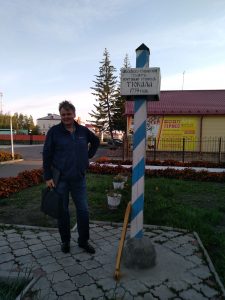
Where can Chekhov be found in Tiukalinsk? Well, it is rumored that the street originally named “Prison” Street (“Tiuremnaya”), now bears the name Chekhov. The town celebrates the writer periodically with a theatrical festival http://eventsinrussia.com/event/17939. There is a museum, but it turns out to have moved out of its original building, and it is not open today anyway.
But in the former museum building–small, whitewashed brick–there’s a sign of life. Two women step out and are accosted for information. Come on in! They are in the process of opening up a theater space here. The theater is called “TKhAT Imeni Chekhova” (the Chekhov Tiukalinsk Art Theater), echoing Chekhov’s famous “MKhAT” (Moscow Art Theater). It is a community effort, with many contributors, and the fall season will open soon. Everything feels fresh–there’s the smell of fresh paint and varnish, newly sewn costumes, and a bare stage that inspires visitors to leap up and try out dramatic poses.
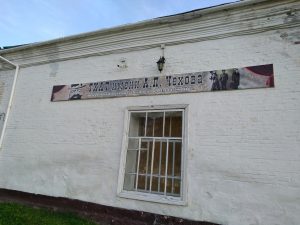


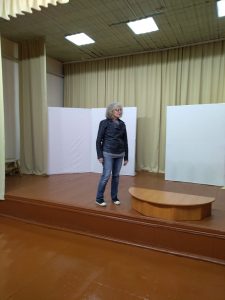
We do not see here what we thought we might see–maybe something Chekhovian in the Tiukalinsk Museum. And I’m sure there’s something in there! But that is OK. What would life be like if all of your expecations came true? What we have seen is enough. And we can go back to Omsk.
There are traces of Chekhov in Tiukalinsk, and on the rivers and roads of Omsk oblast, and all over Siberia, and not just on street names or theaters. Everywhere he went, he saw stories. These stories linger in the air.
Some of these he wrote down. Others he left for us.


This really is an amazing account of a journey to walk in Chekhov’s footsteps and understand his art. I found it very interesting and informative. There is a Facebook page about Chekhov’s book called “Sakhalin Island” for those interested.
Thank you for reading, James!
Another thing, I really like this quote from the article:
“I have begun to believe in magic, in fate, in mysterious forces, in the invisible, and in wishes that might come true. Don’t tell my boss, for my workplace values the rational and empirical, and fully believes that science can explain human behavior, and that everything of importance can be quantified.”
That quote is definitely true. I think that there are those that hide behind the “empirical” simply because it is easier. If you surrender to the limited world of data and the quantifiable, you can be untroubled by the clear truth: that there is so much beyond perceived, data driven reality. The world is wonderous and clearly the work of a benevolent God. But God complicates things, so He is ignored and as a result the real pursuit of what is true is harmed.
Thank you, James for these great comments. Thank you for reading!